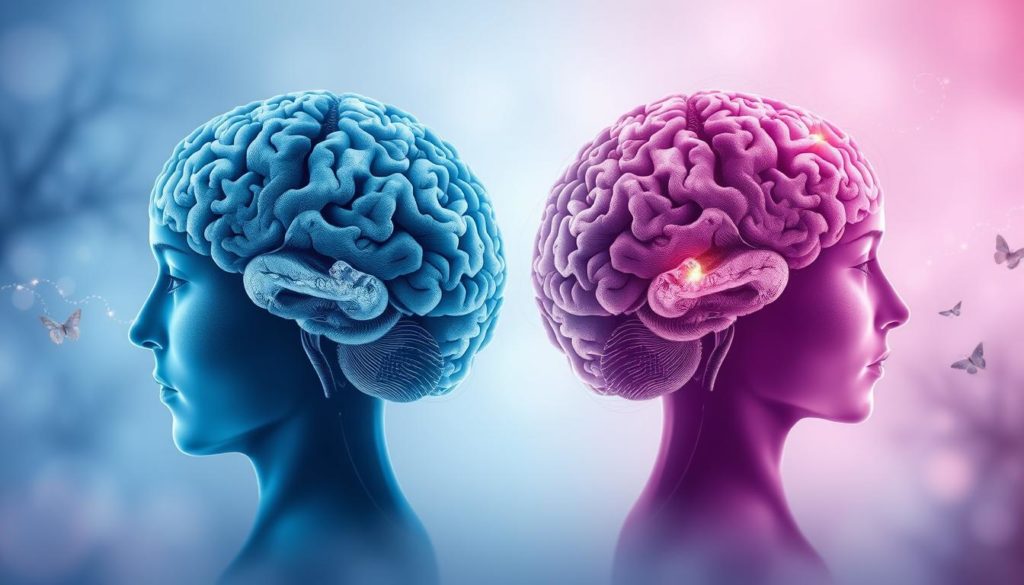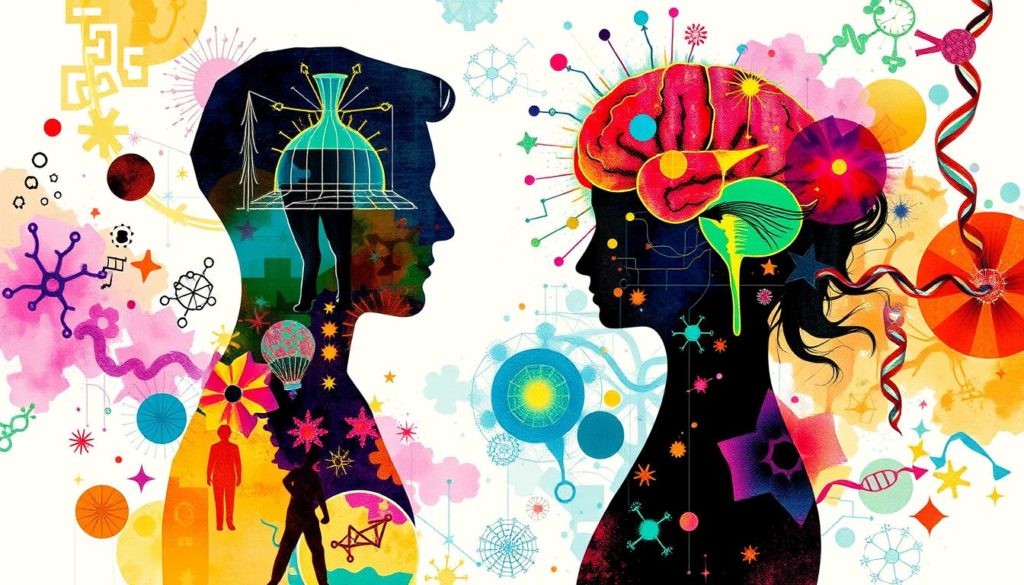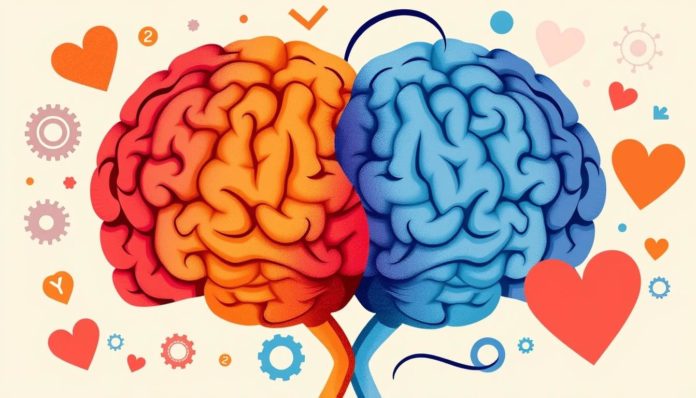Did you know women are almost twice as likely to get Alzheimer’s compared to men? This fact highlights big differences between genders in Alzheimer’s. It shows we need to look at how it affects men and women differently. Plus, women live longer, which plays a role.
Men and women have common risk factors like the ApoE4 gene. But, its effect is stronger in women. This points to different causes. Also, women’s unique life events like menstruation, pregnancies, and menopause are crucial. The drop in estrogen during menopause is linked to Alzheimer’s.
Traditional roles and unequal chances in education and work also affect Alzheimer’s differences. For a long time, studies mostly looked at men. This left women’s experiences with the disease less understood.
Overview of Alzheimer’s Disease
Alzheimer’s disease is a brain disorder that gets worse over time. It leads to problems with memory, thinking, and behavior. Millions of people around the world are living with it. The effects vary across different groups, including men and women.

What is Alzheimer’s Disease?
It’s the leading cause of dementia in older adults. Both men and women can have it, but it affects them differently. Knowing about Alzheimer’s in Men vs. Women helps create better support for everyone.
General Symptoms of Alzheimer’s
Alzheimer’s brings many challenges, such as:
- Memory loss that disrupts daily
Alzheimer’s Prevalence in Males and Females
Alzheimer’s disease affects men and women differently. It’s important to know these differences to improve research. This knowledge helps us treat Alzheimer’s more effectively in everyone.

Statistics on Alzheimer’s Disease
Women are almost twice as likely as men to get Alzheimer’s. This big difference shows we need to study men and women separately. Although progress has been made, we still need more research focused on these gender differences.
Age and Alzheimer’s Disease
Age plays a key role in Alzheimer’s gender differences. The older people get, the higher their risk of Alzheimer’s. Some studies say that in older age groups, the risk between men and women may even out.
Looking into how age and gender affect Alzheimer’s can tell us a lot. It helps us understand the impact of biological differences and life experiences.
Key Risk Factors for Alzheimer’s in Men and Women
Understanding Alzheimer’s risk factors for both genders is crucial. It helps tackle the differences in Alzheimer’s care and research. Both men and women face common risks like aging and genetic issues. Yet, their unique biological and life experiences also matter a lot.
The ApoE4 gene variant is a significant risk factor. Studies show that women with this gene are more likely to get Alzheimer’s than men. The exact reasons for this higher risk are still being studied. It might involve the way hormones and genes work together.
When it comes to brain injuries, there are clear gender differences. Men tend to have more traumatic brain injuries. But, recent findings suggest that women’s cognitive decline after such injuries can be worse. The hormonal shifts during menopause also play a role. A drop in estrogen levels during this time may affect brain health more.
A big hurdle in understanding these gender differences is past research focus. Studies often favored male subjects. This has made it harder to fully grasp how risk factors differ between men and women.
To better tackle Male vs. Female Alzheimer’s risk, future research must look into these gender-specific aspects. Achieving a balance in study participants is also key.
Below is a table that outlines the main differences and similarities in Alzheimer’s risk factors:
| Risk Factor | Men | Women |
|---|---|---|
| Age | Significant | Significant |
| ApoE4 Gene | Higher Risk | Much Higher Risk |
| Brain Injury Susceptibility | High | Potentially More Severe Cognitive Decline |
| Hormonal Changes (e.g., Menopause) | Not Applicable | High Impact |
Exploring these details lets us better understand Alzheimer’s in Men vs. Women. This knowledge directs us towards more effective prevention and treatment options, tailored to each gender.
Impact of Genetics on Alzheimer’s Risk
Genetics play a big role in the chance of getting Alzheimer’s. Certain genes are key players. The ApoE4 gene is one of the top genetic risk factors known today.
The Role of the ApoE4 Gene
The ApoE4 gene variant is a crucial genetic marker for Alzheimer’s. People with this gene have a higher risk. It’s a major factor after age.
Men and women both can carry ApoE4. But, it’s more serious in women’s dementia risk. Finding out how ApoE4 affects Alzheimer’s differently in men and women is vital.
Differences in Genetic Risk by Gender
Research shows that genetic risks, like the ApoE4 gene, impact men and women differently. The disease shows up and acts differently in them. For example, women with ApoE4 are more likely to get Alzheimer’s than men with it.
This difference points to the need for research focused on each gender. We need to know why these differences exist. And how we can use this knowledge in treatments and prevention.
Hormonal Differences Affecting Alzheimer’s Risk
Understanding hormones helps us know why more women than men get Alzheimer’s. It also points us to new ways to prevent the disease.
The Role of Estrogen and Progesterone
Estrogen and progesterone are crucial for the brain. Estrogen is especially important because it protects the brain. This hormonal influence on Alzheimer’s disease shows in how these hormones work with brain cells to lower the disease risk.
Progesterone also helps keep the brain healthy, but we don’t know as much about it as we do about estrogen. Researchers are still studying how these hormones together can influence the risk of getting Alzheimer’s.
Menopause and its Impact
Menopause causes a big drop in estrogen and progesterone. This drop can impact brain health badly. The link between menopause and Alzheimer’s risk is clear because of estrogen’s role in keeping the brain working well. Thus, women may face a higher Alzheimer’s risk after menopause.
Hormone Replacement Therapy (HRT) might lower this risk, though. Early doubts about HRT and dementia have given way to hope. Now, some studies suggest HRT could make Alzheimer’s less likely. But, more research is needed to be sure.
Lifestyle Factors Influencing Cognitive Decline
Understanding how our lifestyle can impact our mental health is now crucial. We want to stop Preventing Alzheimer’s disease. Education, work, and keeping our minds active help delay mental decline.
The idea of cognitive reserve is essential. It’s about the brain’s skill to find new ways to solve problems. By doing things like learning new languages or solving puzzles, we make our brains better.
Historically, not everyone had the same chances for learning and skilled work. This is true especially when comparing men and women. Often, men had more chances to build a strong cognitive reserve than women.
Historically, men might have had more chances for mental stimulation. But now, more women are getting those opportunities too. It’s important that both men and women can learn and stay mentally active. This helps keep our brains healthy and fights off Preventing Alzheimer’s disease.
Lifestyle factors really matter when it comes to mental health. Here’s why:
- Getting a good education helps.
- Working in jobs that challenge us is good too.
- Keeping our minds busy with activities like reading or playing instruments also helps.
Doing these things can lower the risk of Alzheimer’s. It’s important to start these habits early. And keep them up to support our mental health as we age.
Traumatic Brain Injury and Dementia Risk
New studies show a worrying link between traumatic brain injury (TBI) and dementia. TBI is now seen as a major danger for getting dementia, including Alzheimer’s. This knowledge is crucial for protecting athletes and for understanding why men and women are affected differently by brain injuries.
Impact on Men vs. Women
Research finds that women might be more at risk of lasting brain issues from TBIs than men. This may be due to hormone differences and how each gender’s body reacts to injuries. These factors change how the brain is affected both right after the injury and later on, showing the need for care that considers these differences.
Preventative Measures in Sports
It’s important to protect athletes from the dangers of TBIs. By taking steps like using gender-sensitive concussion rules, better safety equipment, and raising awareness, we can help prevent these injuries. Handling injuries well, especially in female athletes, is crucial for avoiding the long-lasting effects that can lead to dementia.
Differences in Alzheimer’s Symptoms by Gender
The way Alzheimer’s disease shows up can be different in men and women. It’s very important to understand these differences to diagnose and manage it correctly. Men may show more behavioral and mood issues. Women might have more trouble with memory and thinking.
There are specific Alzheimer’s symptoms that appear more in one gender. Women often have a harder time remembering words, which might lead to them not getting diagnosed as early. Men might start having trouble understanding or picturing space and distances. This can make it dangerous for them to move around without help.
Here’s a closer look at how Alzheimer’s symptoms can vary between men and women:
| Symptom | Men | Women |
|---|---|---|
| Behavioral Changes | Aggression, agitation | Depression, anxiety |
| Visuospatial Abilities | Early decline | Less pronounced |
| Verbal Memory | Less impacted | More impacted |
| Cognitive Reserve | Lower resilience | Higher resilience |
Understanding these gender-specific symptoms helps in creating better treatment plans. It’s vital for research to keep focusing on these differences. This will help improve how we treat Alzheimer’s in everyone.
Influence of Education and Cognitive Reserve
Education’s role in fighting Alzheimer’s is widely studied. Research shows that more education can lower dementia risk. This ties into the “cognitive reserve” theory. Lifelong learning and brain-challenging activities strengthen the brain against diseases like Alzheimer’s.
Impact of Education on Dementia Risk
Studies find that more school years mean less Alzheimer’s risk. Education builds a strong brain network, protecting against Alzheimer’s. Keeping the brain active helps delay or prevent dementia symptoms.
Historical Disparities in Educational Opportunities
It’s important to note past inequalities in education access. These gaps have particularly impacted women and marginalized communities. Less education for women in the past links to higher Alzheimer’s rates today.
People with fewer opportunities for education, often from lower socioeconomic backgrounds, have less cognitive reserve. This makes them more prone to dementia. Ensuring educational equality is crucial in battling Alzheimer’s. By making education accessible to everyone, we arm future generations with the mental strength to fight dementia.
FAQ
What is Alzheimer’s Disease?
Alzheimer’s disease slowly destroys the brain. It causes memory loss, trouble thinking, problem-solving issues, and changes in behavior and personality.
What are the general symptoms of Alzheimer’s?
Both genders suffer from memory loss and confusion. But, the disease may affect men and women differently.
What are the statistics on Alzheimer’s disease in men vs. women?
Women are more likely to get Alzheimer’s than men, with twice as many affected. The disease’s risk for the same age in both sexes isn’t fully understood yet.
How does age affect the risk of developing Alzheimer’s disease?
Age significantly increases Alzheimer’s risk. Women generally outlive men, which raises their chances of being diagnosed.
What is the impact of genetics on Alzheimer’s risk?
Genetics play a crucial role in Alzheimer’s risk. The ApoE4 gene raises dementia risk, especially in women, more than in men.
How do hormonal differences affect Alzheimer’s risk?
Estrogen protects the brain. When estrogen levels drop during menopause, women’s dementia risk may increase due to this loss.
How do lifestyle factors influence cognitive decline?
Education, job type, and mental activities influence cognitive decline. Being engaged intellectually throughout life builds a stronger brain.
What is the link between traumatic brain injury (TBI) and dementia?
TBI is linked to a higher dementia risk. Studies show women are more affected by TBIs and their long-term effects than men.
How do Alzheimer’s symptoms vary between men and women?
Alzheimer’s might cause various symptoms in men and women. But, our understanding is limited because research has often overlooked gender differences.
What is the influence of education on dementia risk?
Higher education levels can lower dementia risk by strengthening the brain. Historically, women had fewer educational opportunities, affecting their dementia risk.


